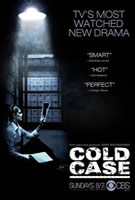Cold Case Episode 6.19 Libertyville
- Kathryn Morris as Lilly Rush
- Danny Pino as Scotty Valens
- John Finn as John Stillman
- Jeremy Ratchford as Nick Vera
- Thom Barry as Will Jeffries
- Tracie Thoms as Kat Miller
- Johnathon Schaech
- Ken Howard
- Constance Towers
- Deborah Geffner
- Brant Cotton
- Makenna Barrett
- Sam Littlefield
- Harve Presnell
- David Arrigotti
- John Aprea
- Ron Gilbert
- Claire Titelman
- Phoebe Dorin
- Lukus Grace
- Erica Ash
Rush and the team reopen the case of the 1958 murder of a talented and up-and-coming real estate mogul, Julian Bellowes. Julian was a Wharton graduate who managed, in their first meeting, to impress the owner of one of the most successful construction companies in Philadelphia, Harrison Kemp. Julian convinced Kemp to take acres of desolate corn and potato fields and make them into thousands of affordable homes for blue-collar working families; Julian called it Libertyville. He also fell in love with and married Kemps daughter, Caroline, which secured his place in the prominent family as well as the company; which Caroline's brother Harry was in no way happy with. Julian was a good man that kept a dark secret that he increasingly feared would get out and destroy not only his career but his marriage; he was an African-American man that had been posing as a Caucasian man since he left the armed services. He planned to free himself of the secret and do right by his family and community and integrate Libertyville at a time when integration was a taboo subject. Before he could come clean and spearhead his suburban dream he was murdered. In the weeks before his murder, several people from his past returned to his life and one decided that Julian took the easy way out and had to finally pay for abandoning his identity and his people in order, as the killer saw it, to further his own professional goals without having to endure the trials of most of the African-American community at that time.









